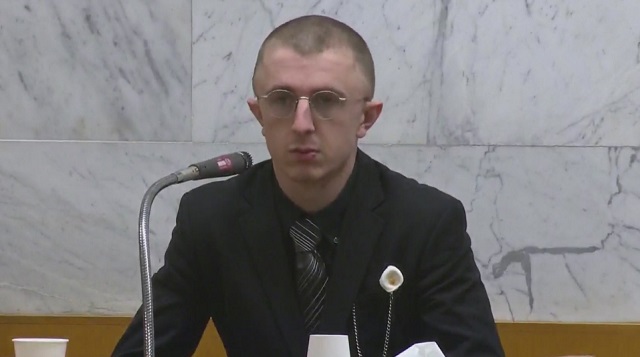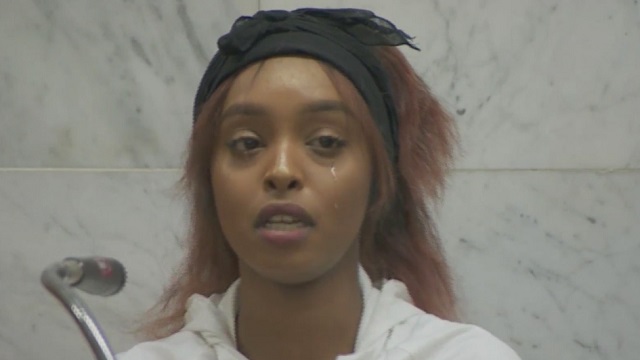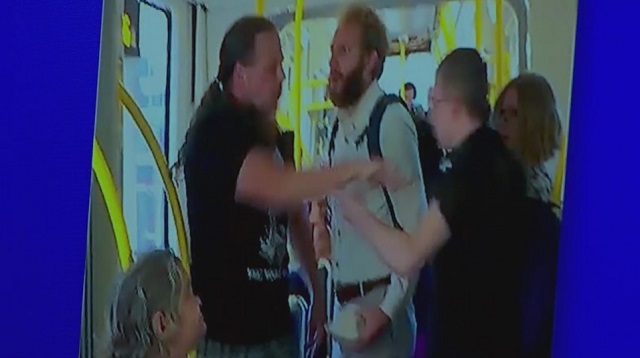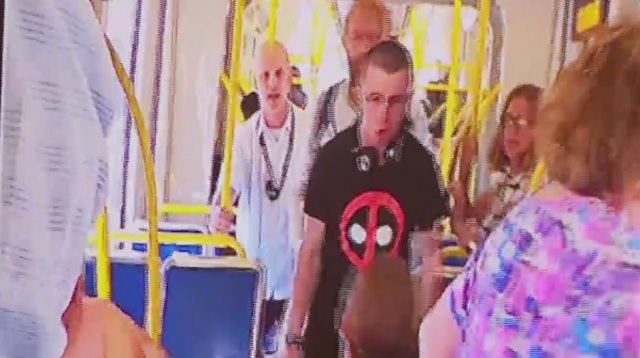PORTLAND, Ore. (KOIN) — Micah Fletcher, the man critically wounded in the 2017 MAX attack, took the stand Tuesday just a few feet away from the man accused of stabbing him and killing 2 others.
The 24-year-old spoke calmly and directly about the moments that led up to his nearly-fatal confrontation with Jeremy Christian on a Green Line at the Hollywood Transit Center on May 26, 2017.
MORNING TESTIMONY
Micah Fletcher told prosecutors he was diagnosed with autism around the age of 8. Adults in his life noticed he did not socialize like other kids his age. In court, Fletcher spoke in a sometimes stilted, methodical way, which prosecutor Jeffrey Howes prepared jurors for last week.
Fletcher said he had to be taught to recognize facial expressions and listen to other people to recognize if what he’s saying is upsetting them. He said he endured bullying in middle school and was “jumped at least twice a week.” He credits that to his autism, which led him to break social rules, resulting in anger from his peers.

Fletcher told prosecutors he is not a member of any organized protest group, but has attended protests after learning about them on social media. At one protest in April 2017 in Vancouver, Fletcher was arrested, accused of throwing a smoke bomb.
Prosecutor Jeff Howes said that Fletcher accepted responsibility and did a diversion program. As far as Fletcher knows, the charge has been dismissed.
Crossing paths with Jeremy Christian
A few weeks later, Fletcher attended the same free speech rally as Jeremy Christian in Montavilla, where Fletcher grew up.
Fletcher told the court he wore a clown nose and was juggling in part because some of his friends were real-life carnival workers and he had picked up juggling. He thought it would be a good opportunity to test those skills and keep an eye on things in his neighborhood.

Howes asked why he didn’t bring signs like other protesters. Fletcher answered that it would lend “seriousness” to the event. He also wanted to make it “less scary for other people.”
Fletcher remembers seeing Christian there, wearing a variation of the American flag. The two were captured on camera near each other once. Christian was very loud and eventually gave what Fletcher believed to be a Nazi salute, Fletcher said.
The day of the MAX Attack
Flash forward a few more weeks to May 26, 2017. Fletcher was a PSU student and working at a pizza company.
Asked to list things he believed in strongly enough to speak out, Fletcher said he would “definitely say” he is not a fan of racism, sexism, homophobia or anything like that. He believes in stepping into uncomfortable situations that others might be too afraid or inexperienced to handle when necessary.
On the MAX train that Friday afternoon, Fletcher said he had headphones on that are designed to be “quite loud.” There aren’t a lot of things he hears over those headphones, but he said he heard a gentleman shouting about a number of different topics — Saudi Arabia, Muslims, and getting the f— out of America, he told the courtroom Tuesday morning.

He said he turned and saw Christian yelling at two young girls, one in a hijab. She was the only person in obvious religious clothing, Fletcher said, so he believed it was directed at her. He said the girls appeared to be “shrinking” back.
The next thing he remembers is getting up and moving toward Christian “basically screaming for him to shut the f— up.” Fletcher acknowledged he used harsh language and pointed his finger at Christian and wasn’t considering the “appropriateness” of his actions.
“Whether or not something’s appropriate, if it is right, then you should do it,” Fletcher said.
He said he wanted Christian to understand that he was being watched and judged.
Fletcher described other people on the train as displaying fear or apathy, depending on the person. He saw Shawn Forde engage with Christian “more politely” and recalled Forde saying, “I’m going to ignore you now.”

At that point, Fletcher said Forde turned to him and said Christian was “just talking.” By then, Fletcher said he had recognized Christian.
Fletcher said Christian continued to rant. There was a moment when he was no longer facing Christian and heard a loud strike. Fletcher saw Christian standing nose-to-nose with Namkai-Meche and was certain that Christian had hit the other man.
Although both Christian and Namkai-Meche were both much larger than Fletcher, who was about 5-feet-8 and 140 pounds back then, he testified he immediately rushed toward the situation before things could escalate.

“I just simply did what I thought I should do,” he said, adding that Namkai-Meche looked like somebody who had never been in a fight in his life and, based on his stance, was not prepared.
Fletcher, on the other hand, knows Tae Kwon Do.
Based on his own experience with bullies, Fletcher said he knows “what it looks like before somebody hurts somebody else.”
He remembers getting between Christian and Namkai-Meche and then being pushed “rather hard.” At that point, he said he had not touched Christian or threatened him. Then he said Christian touched Namkai-Meche, at which point Fletcher grabbed Christian.
“… it wasn’t about me. This wasn’t about me feeding my ego,” Fletcher told the court. “I cared about whether or not the other person was getting hurt.”
Fletcher said he didn’t know Christian had pulled a knife. He was telling Christian to “get the f— off the train. Go on, get,” he said.
At one point, Fletcher said, Christian said something like, “Hit me again.” Fletcher pushed him and he fell.
Video shows Fletcher push Christian down twice. The second time Christian got up and said, “Hit me again,” Fletcher did.
“He responded by stabbing me in the throat,” Fletcher said, quietly at first, then he repeated it louder.

Fletcher thought he had been punched originally, then he realized he was bleeding.
“That’s odd,” he recalled. “Then I realized there was blood on my shirt. A lot of it. Then I realized it was coming from my neck.”
Called his mom
Fletcher testified he immediately put his hand to his neck to apply as much pressure as possible and began to move around the train, but not so much as to elevate his heart rate. He said he was aware that the faster his heart beat, the faster he would bleed to death.
He got off the train thinking, “I’m going to die.”
Fletcher remembers Marcus Knipe using his bare hand, then a jacket and a blanket, to try to stop the bleeding. He also remembers calling his mom, thinking that these were going to be his last moments.
Fletcher became emotional telling the story of that phone call. He told her he got hurt but “don’t worry. It’s fine.”
He told her he loved her and that he’d see her soon, and then he asked her to call his work and tell them he wouldn’t be in that day.

Sitting in the courtroom Tuesday, Fletcher’s mother blew her nose.
Fletcher underwent surgery, spent four days in the hospital, and now has a long scar on the side of his neck. It causes him some limited mobility – “enough to be troublesome” – and reminds him of that day, but he is alive.
He “religiously” performed his physical therapy exercises for about two months, and still does them sometimes. In fact, a photographer from National Geographic took some photos of him doing those stretches.
The jury had to leave the courtroom while the defense objected to the photo being shown in court. Attorney Dean Smith argued it wasn’t relevant and that the photo would create an emotional reaction. It depicts Fletcher with his hands over his throat and a look of pain over his face.
The judge sided with prosecutors, but cautioned them to make it clear to jurors that Fletcher is depicted doing an exercise at the instruction of his doctor.
The jury returned and saw the photo.
Prosecutors wrapped up their questioning by asking Fletcher about the fact he attended another protest in June 2018, where he could be seen drumming. They asked why he did that.
“A) I like playing the drums … so it’s an excuse to leave the house and play the drums,” he said. “And there was a small part of me that wanted to prove to myself that I wasn’t afraid to.”
Cross-examination
When cross-examination began Fletcher and defense attorney Dean Smith were cordial until Smith started questioning Fletcher about Shawn Forde’s involvement. Smith inferred Forde had achieved Fletcher’s stated objective of drawing Christian’s attention away from the two teens.
Smith said that wasn’t enough for Fletcher and he decided something had to be done.
Fletcher’s tone became annoyed and said he wouldn’t put it that way. Rather, he wanted to make sure there was an “added layer of separation” between Christian and the young ladies.
Occasionally those in the courtroom laughed at Fletcher’s responses to questioning.
The defense attorney asked Fletcher about his prior involvement in protests in both Vancouver and in Montavilla. Smith said protesters were honking horns at the “free speech” rally, suggesting that impeded on protesters free speech.
Fletcher argued no one put their hand over people’s mouths to prevent them from talking.
Autopsies put into evidence
PORTLAND, Ore. (KOIN) — The former chief medical examiner for Multnomah County took the stand in the MAX attack murder trial of Jeremy Christian on Tuesday, providing a detailed and grisly insight into the deaths of Ricky Best and Taliesin Namkai-Meche.
Dr. Karen Gunson said she has performed around 7,000 autopsies in her career, including on both Best and Namkai-Meche. When the autopsy photos for Ricky Best were shown in court, 2 women in the courtroom were seen gripping each other’s hands.
Gunson said Best bled to death from a stab wound that hit the vertebral artery on the left side of his body. Stab wounds of the neck was the cause of death.

The autopsy of Namkai-Meche was done the same day, she testified. Gunson pointed out a stab wound of the left neck, shallow stab wound of left forehead, a wound on the back/base of the skull, and sharp force injury to back of left hand.
The slice that ran vertically in the carotid artery was the one that killed Namkai-Meche, according to Gunson. She said a cut like that would almost always be fatal because “it would be virtually impossible for a trauma surgeon to suture” and bleeds too fast.
Gunson said that trying to perform first aid/holding cloth to the bleeding would not be able to stop it.
The manner of death for both Ricky Best and Taliesin Namkai-Meche was ruled homicide — that is, death at the hands of another.
Monday’s testimony
Monday’s court proceedings saw testimony from a man who followed Jeremy Christian off the train, Portland police officers and detectives who responded to the scene and arrested Jeremy Christian—plus a 30-minute video of his arrest and delivery to the police station. About 20 minutes into the video, as he is being driven to the police station in handcuffs and a spit hood, Christian said: “This is a hate crime. Hope they all die. Hope they all die.”
THE CHARGES AND THE TRIAL
The trial started January 28 at the Multnomah County Courthouse. Witnesses have provided painful first-hand accounts of what happened on the Green Line train at the Hollywood Transit Center on May 26, 2017.
Jeremy Christian is accused of killing Taliesin Namkai-Meche and Ricky Best and nearly killing Micah Fletcher that day on the train. He has pleaded not guilty to 12 charges: two counts of first-degree murder, one count of first-degree attempted murder, one count of first-degree assault, one count of second-degree assault, three counts of second-degree intimidation, two counts of unlawful use of a weapon and two counts of menacing.
Digital reporter Hannah Ray Lambert covers the Jeremy Christian trial for KOIN 6 News and KOIN.com. Follow her on Twitter for constantly-updated, minute-by-minute breakdown of the testimony.
Complete KOIN Coverage: The MAX Attack Trial
KOIN 6 News will be in the courtroom each day
and provide updates throughout the case